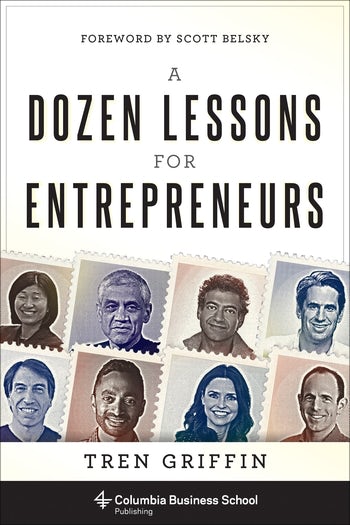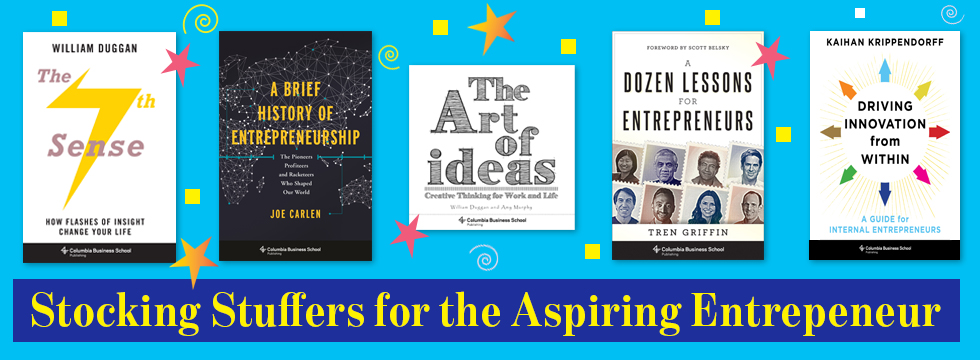Reflections on A Dozen Lessons for Entrepreneurs
By Tren Griffin

 “When I first came to Silicon Valley, I was struck by how much people teach and learn from one another. In this book, Tren continues that spirit by sharing his own learning from others—and explains how investment judgments and decisions are made in the world of tech start-ups.”
“When I first came to Silicon Valley, I was struck by how much people teach and learn from one another. In this book, Tren continues that spirit by sharing his own learning from others—and explains how investment judgments and decisions are made in the world of tech start-ups.”
~Marc Andreessen, cofounder of Netscape and Andreessen Horowitz
This week’s featured Columbia Business School Publishing book is A Dozen Lessons for Entrepreneurs, by Tren Griffin. Budding business owners and leaders are always looking for the key to success. In today’s post, Griffin draws on his work to offer his advice to aspiring entrepreneurs. Make sure to enter our book giveaway for a chance to win a copy of this work.
• • • • • •
Being an entrepreneur is not a rational act given the poor odds of success. It can also be one of the most rewarding experiences possible. The best entrepreneurs are driven by a mission rather than being mercenaries. The books that resonate most strongly with entrepreneurs accurately describe the terror, inevitable setbacks and daily struggle of life in a start-up business, not just the seemingly glamorous parts. The best way to learn is always based on firsthand experiences in the trenches. Experienced entrepreneurs are always looking for ways to learn more, and the last thing they want to read is a fictional account of how glamorous starting or running a business can be. Charlie Munger once said: “Obviously the more hard lessons you can learn vicariously, instead of from your own terrible experiences, the better off you will be.” One of the best ways to accelerate learning is to read the right books and talk to the right people.
The best entrepreneurs seek wisdom. The key to acquiring wisdom is judgment, and the key to honing judgment is experiencing bad judgments: your own, those you observe, and those you read about. Learning from your mistakes and the mistakes of others is critically important, and the best way to do that in a scalable way is to read extensively and to talk to as many people as you can.
“Experienced entrepreneurs are always looking for ways to learn more, and the last thing they want to read is a fictional account of how glamorous starting or running a business can be.”
My book A Dozen Lessons for Entrepreneurs is a collection of wisdom from scores of experienced and successful businesspeople and investors. The book is designed to accelerate a reader’s journey to success as an entrepreneur. Because what an entrepreneur must do successfully is so broad and varied the lessons in the book are necessarily multidisciplinary. My previous book Charlie Munger: The Complete Investor is designed to inform anyone, including entrepreneurs, how to become a multidisciplinary thinker. Munger believes: “You must know the big ideas in the big disciplines, and use them routinely—all of them, not just a few. Most people are trained in one model and try to solve all problems in one way. You know the old saying: to the man with a hammer, the world looks like a nail. This is a dumb way of handling problems.”
The good news about the challenging reality for an entrepreneur is that the work is always interesting and the opportunities often fresh. Sean Parker famously once said: “Running a start-up is like eating glass. You just start to like the taste of your own blood.” After quoting what his friend Sean Parker just said, Elon Musk added this:
Generally, starting a business, I’d say, number one is have a high pain threshold. There’s a friend of mine who’s got a good saying which is that starting a company is like eating glass and staring into the abyss. That’s generally what happens because when you first start a company—there’s lots of optimism and things are great. Happiness at first is high, then you encounter all sorts of issues and happiness will steadily decline, and then you will go through a whole world of hurt, and then eventually, if you succeed—and in most cases you will not succeed.
A Dozen Lessons for Entrepreneurs represents a thorough explanation of the key concepts that an entrepreneur will encounter. The reader will learn about product market fit, business models, employee compensation, distribution, pricing, sustainable competitive advantage, network effects, wholesale transfer pricing, raising capital, and a range of other important concepts and skills.
Everyone must travel their own path to becoming a successful entrepreneur, but there are many people who are willing to help if you are willing to ask and genuinely listen. While there are best practices, there is no single recipe that an entrepreneur should follow. By better understanding the views and experiences of a wide range of executive coaches, successful venture capitalists, and entrepreneurs, readers can discern which of many possible paths will lead to success.
Explore more from Columbia Business School Publishing and save 30% when you order from our website by using coupon code: CUP30 at checkout. Check back throughout the month for more from our CBSP authors!





